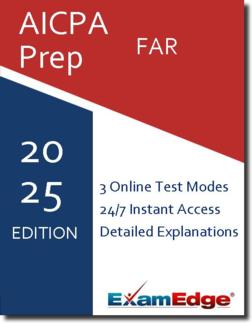AICPA FAR (FAR) Practice Tests & Test Prep by Exam Edge - Topics
Based on 28 Reviews
- Real Exam Simulation: Timed questions and matching content build comfort for your AICPA FAR test day.
- Instant, 24/7 Access: Web-based AICPA Financial Accounting and Reporting practice exams with no software needed.
- Clear Explanations: Step-by-step answers and explanations for your AICPA exam to strengthen understanding.
- Boosted Confidence: Reduces anxiety and improves test-taking skills to ace your AICPA Financial Accounting and Reporting (FAR).

Understanding the exact breakdown of the AICPA Financial Accounting and Reporting test will help you know what to expect and how to most effectively prepare. The AICPA Financial Accounting and Reporting has 66 multiple-choice questions The exam will be broken down into the sections below:
| AICPA Financial Accounting and Reporting Exam Blueprint | ||
|---|---|---|
| Domain Name | % | Number of Questions |
| Conceptual Framework, Standard-Setting and Financial Reporting | 25-35% | 21 |
| Select Financial Statement Accounts | 30-40% | 25 |
| Select Transactions | 20-30% | 17 |
| State and Local Governments | 5-15% | 4 |


